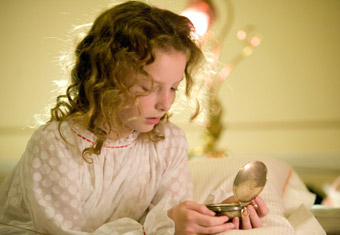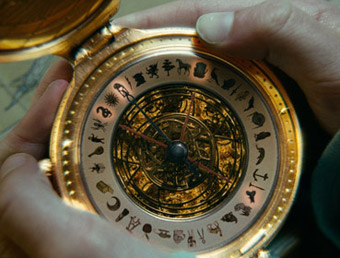|
This summer I was chatting with friends about the recent boom of the fantasy genre and how I was not really a convert of either Harry Potter or Lord of the Rings. One of my mates suggested that if I wanted to try something different in the fantasy arena then perhaps give Phillip Pullman's His Dark Materials trilogy a read. He also told me that a film I had heard rumours of named The Golden Compass was an adaptation of the trilogy's first volume, Northern Lights. I took up the reading of these novels partly in curiosity and also with a mind to be able to look at the film in an educated light after having read the book. After reading Northern Lights I was charmed enough to pick up the two sequels and dive further into Pullman's world. The result found me not a total convert to this fantasy lark, but somewhat more sympathetic to its appeal. Pullman's books are flawed but in some ways wonderful, so there was much to look forward to, or dread, in the upcoming movie.
For those unfamiliar with Northern Lights (the titled was changed in the States to The Golden Compass for reasons a humble unassuming Brit like me cannot fathom), the story as according to the film is as follows...

Lyra Belaqua (Dakota Blue Richards) is an orphaned 12-year-old girl who lives in a world parallel to our own. This world is very similar to ours, the main difference being that their 'souls' roam free of their bodies in the form of animals called daemons. Lyra lives at Jordon College, a part of their Oxford University where she has grown up in the care of the scholars. Her only known surviving relative, Lord Asriel (Daniel Craig) comes to the college to ask for money for his upcoming expedition to the North to investigate the phenomenon of 'Dust', which seems to have some involvement with people's daemons and possible rift in space where a parallel world can be seen. The authority known as The Magisterium calls this business heresy and is trying to hinder Asriel by poisoning him, although their attempt is thwarted by Lyra. Meanwhile children are being abducted by an unknown force that people call 'The Gobblers' and taken away to have strange experiments done on them. Lyra is then taken away by the mysterious Mrs Coulter (Nicole Kidman) to help with her own trip to the North, but not before the Master of Jordon College hands her an unusual looking compass-like device. When Lyra realizes that Mrs Coulter's plans may not be altogether innocent she runs away and is rescued by the 'Gyptians' to embark on a mission to rescue all the children from the hands of the Gobblers, which Mrs Coulter has more involvement with than Lyra first knew. Cue a fantastic adventure with witches, talking bears and hot air balloon rides. I will stop synopsising before the reader loses the will to live!
Now to what the movie was actually like.
Stop press; Summerisle AGREES with majority of other reviews!
The film has the same problem as I have just experienced with writing a synopsis, there is so much story in the book that condensing it down is troublesome. When told of the running time of this film, a mere 112 minutes, I immediately saw this problem coming. An introduction to a trilogy needs to do one thing very efficiently and that is establish the characters, which is more important than ever when trying to rope in the mass audience of a blockbuster. But this cannot be done sufficiently when there is so much story to cover in such a short time. All supporting characters are therefore rendered flat and rather lifeless. Atmosphere and mood must also be established, which also requires a masterful rein on pacing, and where the huge amount of CG effects help in bringing Pullman's richly imagined world to life, the scale that made the likes of New Line predecessor trilogy The Lord of Rings gravitate to epic proportions is not present. These criticisms are pertinent to any narrative of this type, so I am not speaking with direct reference to the book or its screen adaptation just yet, but doing so opens an altogether new can of worms.
Phillip Pullman's Northern Lights funnily enough included the aurora borealis, which is in fact one of the most cinematic elements of the book, yet it does not feature in the The Golden Compass at all. This one example goes a long way to illustrate director Chris Weitz's inability to adequately interpret the material, to the point of not even being able to select scenes that would be obviously workable on the big screen. To have seen a little more effort go into the writing and characterisation would have been nice. So much time was taken with making the animals realistic and the mise en scène jaw-dropping that little attention seemed to be lavished on the most important parts of the movie. An impassionate adaptation redundant of the richly constructed and charming world of the book with a sparse and flat script, The Golden Compass is a let-down to fans of the novel and packs in too much rushed information to be a great joy to those unfamiliar with Pullman's award winning trilogy.

The main set pieces and plot points are all there, be they in a different order to the book (the bear fight which takes place near the end of the book has been moved to the middle, so for dramatic reasons the battle on the ice between witches, Gyptians and soldiers is at the end of the film), but the main plot decision to confound all readers of the original is its ending. Without giving too much away, the ending of Northern Lights not only changes the tone of the entire adventure as well as calling into question moral issues, but also leaves the perfect cliffhanger for the sequel - it's damn near ready-made for the cinema! But for some strange reason I can only put down to the studio and their need for it to be warm and fuzzy enough, Weitz has performed a somewhat ghastly amputation of the final sequence, leaving the film anti-climactic and a little too C.S. Lewis-nice for me.
This brings me to my final criticism, the lack of religious connotation. If nothing else, Pullman's trilogy created quite a stir due to its anti organised religion elements. The Magisterium is seen as an all powerful Catholic-esque religious organization that oppressively governs the entire world. At this point in the literary narrative, Pullman is rather provocative (as the series continues I have issues with the concepts he goes on to explore), and unsurprisingly there is no such religious emphasis on the Magistium in the film. They are portrayed in a well subdued light of subtle threat though, which is in-keeping with the tone Pullman created. Unfortunately this is an oasis of subtlety in a desert of style over content, visually preoccupied twaddle.
On the plus side the casting is perfect, from the fantastically headstrong Lyra by the young unknown Richards to all the drastically underused supporting cast of notable acting talent. The cream of the crop due to his slightly more sufficient time on screen is Sam Elliot's Lee Scorseby, who for me embodies the character so well it was like he'd jumped straight out of the page. This is generally the standard of casting, one can see how much care went into getting the right people for these roles, it's just a shame an equal amount of effort was not dispensed to the script, editing and direction. Chris Weitz bit off rather more than he could chew here and to be viciously honest what could we really expect from the director famed for American Pie?! I implore the head honchos of New Line Cinema to take their heads out of the clouds, take stock in their previous success and employ a decent director and/or writer for the next volume. If not I just hope Mr Weitz will take heed of the poor reviews of this film and pull his finger out for the sequel, not least because it happens to be my favourite in the trilogy!
|